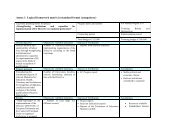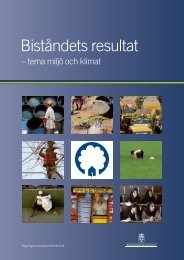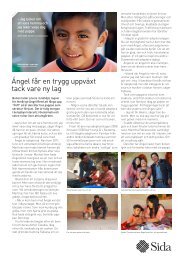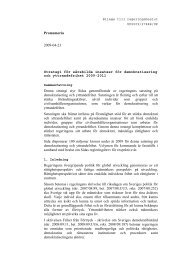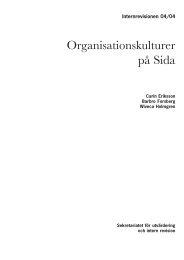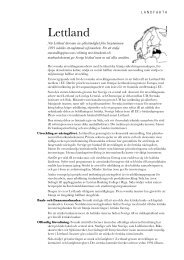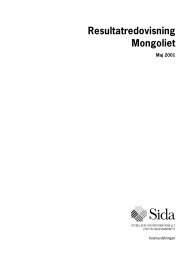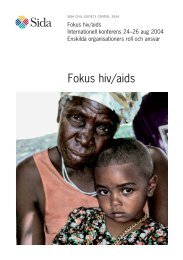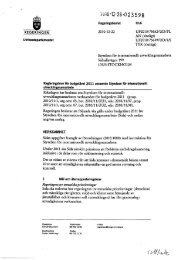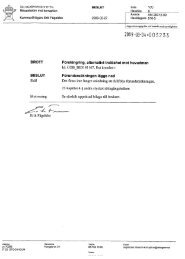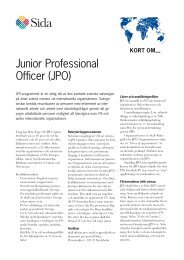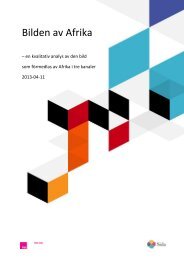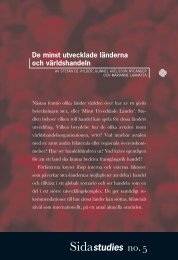Mid-Term Review of the AGIR Programme - Sida
Mid-Term Review of the AGIR Programme - Sida
Mid-Term Review of the AGIR Programme - Sida
You also want an ePaper? Increase the reach of your titles
YUMPU automatically turns print PDFs into web optimized ePapers that Google loves.
2 F I N D I N G S<br />
production and quality <strong>of</strong> evidence and position papers supported by research carried<br />
out by organisations like CIP, IESE , WLSA and o<strong>the</strong>rs.<br />
Despite weak horizontal linkages within <strong>AGIR</strong>, most contacted partners are part<br />
<strong>of</strong>, or in contact with, national and even international networks and <strong>the</strong>y are able to<br />
illustrate how some <strong>of</strong> <strong>the</strong>se networks/linkages have led to advocacy results.<br />
2.4.4 Monitoring and Reporting Structures within <strong>AGIR</strong><br />
The need for a strong monitoring and evaluation structure/framework is important for<br />
a number <strong>of</strong> reasons. As <strong>the</strong> <strong>AGIR</strong> programme moves forward, it will be critical to<br />
make sure that <strong>the</strong>re is an ‘evaluative thinking’ process that evolves in tandem with<br />
implementation activities. At <strong>the</strong> core <strong>of</strong> <strong>the</strong> evaluative thinking process is <strong>the</strong> need to<br />
develop a regular flow <strong>of</strong> monitoring information that is useful, and will be used to<br />
manage <strong>the</strong> programme well. The collection and analysis <strong>of</strong> this monitoring information<br />
will form <strong>the</strong> basis for <strong>the</strong> reflection on experience (learning) that informs<br />
future management decisions and provides data for accountability and reporting requirements.<br />
At each step <strong>of</strong> <strong>the</strong> ‘evaluative thinking’ cycle, <strong>the</strong>re is a need to design<br />
monitoring, evaluation and learning processes that respond to organisational needs<br />
concerning information ga<strong>the</strong>ring about programme progress. This will mean balancing<br />
accountability needs with <strong>the</strong> need for processes which support and encourage<br />
learning, while at <strong>the</strong> same time also providing support for planning and management<br />
processes. These different information ‘needs’ are not in isolation. Monitoring processes<br />
meeting <strong>the</strong> needs <strong>of</strong> one area will also function in support <strong>of</strong> o<strong>the</strong>rs. This iterative<br />
‘evaluative thinking’ process where initial experiences with <strong>the</strong> evaluative<br />
thinking processes are used to enhance content and process in ways most beneficial to<br />
ongoing data collection are essential to a well-functioning monitoring, evaluation and<br />
learning system.<br />
Generally intermediaries seek to report on activities and results achieved, but impact<br />
monitoring is still weak (Semi-Annual Report 2012). Some interviewed partner organisationshave<br />
acknowledged <strong>the</strong> importance <strong>of</strong> training in results-based management<br />
for <strong>the</strong> improvement <strong>of</strong> <strong>the</strong>ir planning and reporting processes. The programme<br />
reports on results achieved based on CSO partner’s reporting systems following <strong>the</strong><br />
principle to respect <strong>the</strong> existing planning, management cycles and accountability processes<br />
(such as reporting to <strong>the</strong> internal governance bodies). Organisational partners<br />
such as ACAMO and even networks like Rede da Criança have a set <strong>of</strong> procedures<br />
for reporting, comprising <strong>the</strong> process <strong>of</strong> <strong>the</strong> collection <strong>of</strong> information from local<br />
branches and local partners and regular reporting to governing bodies.<br />
The <strong>AGIR</strong> programme produces two reports per annum, but this workload is not<br />
transferred to partners. Intermediaries take <strong>the</strong> necessary information from <strong>the</strong> partner<br />
organisation’s reports and feed this into <strong>the</strong> programme’s report. In this regard, it has<br />
been considered by most <strong>of</strong> <strong>the</strong> CSO interviewees to represent a good process for<br />
reporting because it does not impose an additional burden to <strong>the</strong> partners. However,<br />
apart from well-established CSOs, assessing results has been problematic for most<br />
partners with reporting focusing on activities. Reporting has also been more relevant<br />
51



